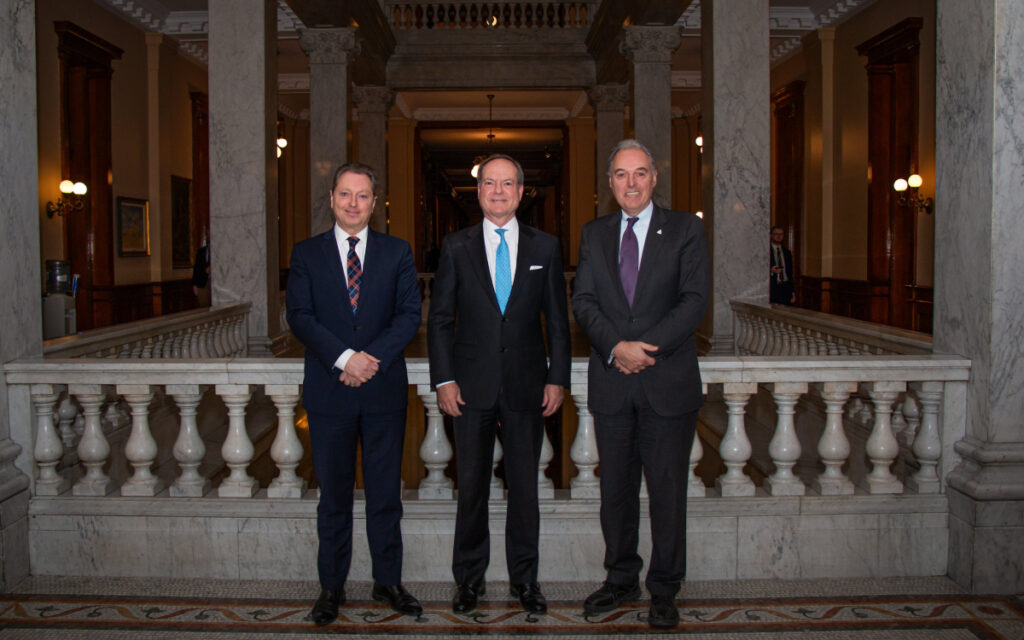
It seems the Ontario Conservatives have gotten used to big spending, and they like it. Pictured are Ontario Finance Minister Peter Bethlenfalvy and MPPs Stephen Crawford and Rick Byers. Photo Credit: Peter Bethlenfalvy/X.
This week the Ontario Conservative government delivered its budget, which was notable only for the fact that it contained no new measures to get the province’s finances back on track. In fact, the deficit of $9.8 billion forecast for the fiscal year 2024-25 more than tripled from the previous year. Last year’s budget forecast that there would be a small surplus this year, not a significantly increased deficit. It seems the Ontario Conservatives have gotten used to big spending, and they like it. The government now claims the budget will be back in balance by 2026-27, which is when the next election will be taking place.
The justification for the larger deficit in the coming year was the expectation that the Ontario economy is slowing so tax revenues will decline. Although this prediction is in line with what most economists are predicting for the next year or so, it still does not account for such a jump in the deficit. To balance the budget this year, it would only have taken a government spending reduction of just over four per cent, which should not be too much to ask considering that most Ontarians are cutting back that much or more due to difficult economic circumstances. The pandemic boosted spending by all governments for a couple of years, but now should be the time to start cutting back.
Spending in the two largest elements of the budget – health care and education – did not increase greatly, creating howls of dismay in the ranks of the opposition parties. This was, however, justified as Ontario is already a very big spender in both areas and is not getting value for the money spent in terms of service quality. Interestingly, the opposition parties were critical of the so-called lack of spending increases in health and education, but also of the increasing deficit. In other words, they were asking the government to suck and blow at the same time.
Infrastructure was also a big-ticket item given the new roads, more transit, more hospitals, housing, recreational facilities etc. being built. There has been much concern over the decline in productivity in Ontario and Canada of late, and deservedly so. The Bank of Canada Governor just declared our poor productivity performance an emergency and, as it is an indicator of our standard of living, this should concern us all. A key measure to improve productivity is investment, and infrastructure spending can be a major contributor to productivity if done efficiently. Considering the gridlock that prevails in the GTA, the added roads should be helpful and the federal government’s ridiculously high immigration targets need to be accommodated by expanded health care and other social services.
Mercifully, no taxes were increased in this budget. The major tax reduction was an extension of the fuel tax cut until the end of 2024. Unfortunately, personal income taxes remain uncompetitively high in Ontario. In 2018 when the Conservatives were first elected, one of their promises was to reduce personal income taxes, which has not as yet happened. Particularly problematic is the fact that the top two income tax brackets in Ontario are not indexed to inflation. This is tantamount to theft, as people’s income tax increases only because of inflation and not because their actual real income is higher.
It’s likely that the government figures they can get away with this politically because these are the income tax brackets of high-income earners, with thresholds of $150,000 and $220,000, and “taxing the rich” is always a popular theme. But if Ontario really intends to be “Open for Business” as they claim, they will want to attract the professionals and entrepreneurs whose earnings are in that range, and excessively high-income taxes are a major deterrent to those desirable residents. And let’s face it – $150,000 is hardly Warren Buffet territory.
One of the key problems these days is that not enough of us voters are demanding better financial management from our governments. Back in the 1990s when Canada was in dire financial trouble, a majority of Canadians were very supportive of cutting back government spending and did not punish governments at the ballot box when they cut back. These days, it seems that most people are not particularly alarmed by our current state of government finances – although they should be- so governments do not feel motivated to change. Too much growth in government and not enough in the private sector is also a key factor that has reduced our economic productivity and our standard of living, so it is imperative that our governments do better for everyone’s benefit.
Sadly, this mediocre Ontario budget will likely look good compared to the federal budget we will see on April 16. If we are to get our economy and standard of living back on track in Canada, we need all of our governments to stop the spending spree. As the largest province in Canada, Ontario would be a good place to start. The Ontario government is coming up to the mid-point in its current term, when they will begin to focus on the next election. Now is a great time for we voters to demand more sensible fiscal policy for all of our futures.

She has published numerous articles in journals, magazines & other media on issues such as free trade, finance, entrepreneurship & women business owners. Ms. Swift is a past President of the Empire Club of Canada, a former Director of the CD Howe Institute, the Canadian Youth Business Foundation, SOS Children’s Villages, past President of the International Small Business Congress and current Director of the Fraser Institute. She was cited in 2003 & 2012 as one of the most powerful women in Canada by the Women’s Executive Network & is a recipient of the Queen’s Silver & Gold Jubilee medals.


















